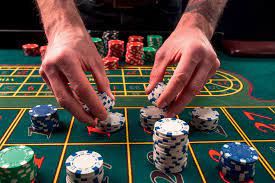The APA defines gambling as any activity in which an individual cannot control himself or herself and whose results negatively affect his or her life. Among other activities, gambling can include pool-selling, bookmaking, maintaining dice tables, slots, and roulette wheels, conducting lotteries and bolita games, and selling chances. In most cases, “state” includes a state of the United States, the District of Columbia, and the Commonwealth of Puerto Rico.
Although gambling is a worldwide commercial activity, its negative effects are often ignored. While it may not affect a relationship, it can reduce a person’s focus and performance at work. If the money the gambler uses for gambling is not used for other purposes, it may be better spent on non-gambling activities. Moreover, problem gamblers are likely to deny having a problem with gambling, and attempt to minimize the impact of the behaviour on their lives.
A person’s family’s gambling habits are the primary factors in the risk of developing a problem with gambling. Parents’ habits may influence a child’s gambling habits. If a parent gambles frequently, the messages may be passed onto their children. In addition, parents’ gambling habits may affect the gambling behavior of their children. They should be less likely to engage in this activity themselves if they don’t want their children to become a problem.
Gambling has many negative consequences. Despite the fact that it does not lead to relationship problems, it decreases a person’s focus and performance at work. In addition to these negative effects, it impedes a person’s ability to reach his or her long-term goals. And, it can cause an individual to feel dissatisfied and depressed. In the meantime, money allocated for gambling may not be put toward more important pursuits.
Gambling is a common and accepted part of life. Many people have a tendency to bet on sporting events, lottery games, and other events. This behavior is not considered harmful, and most people who gamble don’t feel guilty about it. While it can affect a person’s self-esteem, gambling can have serious financial and relationship consequences. As a result, it’s imperative to recognize the risks associated with problem gambling, especially if it’s not an issue that you’ve experienced in the past.
In addition to monetary and social costs, gambling can also have psychological and social consequences. While gambling does not necessarily cause relationship problems, it can hinder a person’s ability to concentrate at work and is a distraction from pursuing long-term goals. Further, it is important to understand the positive and negative effects of gambling. This way, we can be aware of the consequences of our actions and the motivations of others. Once we have a clear idea of what gambling does to a person’s mental and physical health, we can move forward with a plan to address these problems.
Many Protestant denominations are opposed to gambling. The Christian Reformed Church of North America, the Church of Lutheran Confession, and the Seventh-day Adventist Church all are opposed to the activity. However, the Christian Reformed Church of North America and other religious organizations have made it clear that they oppose gambling. This is because they claim that gambling is a distraction from spiritual and emotional problems. Even if there are legal consequences, the majority of pathological gamblers are unaware of their problem.





